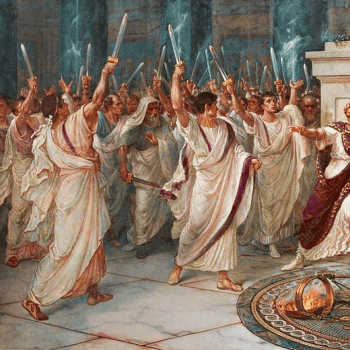Andrew Preston, a noted Cambridge historian and student of religion's influence on American foreign policy, recently wrote in Foreign Affairs about the "faith-based geopolitics" of President Obama. While critical of the frequent disconnect between his rhetoric and diplomacy, Preston notes that in his first term President Obama's most important foreign policy speeches often placed religion "front and center." Notably, in accepting the Nobel Peace Prize, President Obama referenced Reinhold Niebuhr's "theology of irony" to make the point that sometimes force is necessary to achieve peaceful ends. That was not the first time President Obama invoked Niebuhr. Shortly before his 2008 election, the President told editorialist David Brooks that Niebuhr was "one of my favorite philosophers" and explained that he was particularly influenced by Niebuhr's "compelling idea that there's serious evil in the world."
President Obama's faith-based geopolitical rhetoric is not likely to soothe the ears of secularists here and abroad, but religiously-grounded moral rhetoric in the service of America's foreign policy is as American as apple pie. Indeed, a religiously-infused worldview has shaped America's global engagement since its founding.
Certainly no president was more intentional about connecting Christianity to the conduct of foreign policy than our twenty-eighth, Woodrow Wilson. Indeed, Wilson's integration of faith and politics is striking given the extent to which matters of faith have been stripped from the public square over the intervening century. Wilson's faith-based approach to politics is engagingly discussed in Malcolm Magee's short but insightful book, What the World Should Be: Woodrow Wilson and the Crafting of a Faith-Based Foreign Policy(Baylor U. Press, 2008).
It is well known that Woodrow Wilson was a foreign policy idealist and that his approach to it was moralistic. After all, it was Wilson who famously promised that America's participation in World War I would not be about selfish national interest—or realpolitik -- but about the altruism of making the world"safe for democracy." What is not well known about Wilson, and what Magee explains in fascinating detail, is how Wilson's personal and political worldview was profoundly shaped by Reformed Protestant theology. Challenging the prevailing historiography of Wilson that has all but ignored Wilson's theology, it is Magee's thesis that Wilson was a "Presbyterian in politics, a twentieth century John Knox, a Christian statesman whose overriding motivation was his determination to do God's work in a fallen world."
Born four years before the start of the Civil War, the "single-greatest influence" in Woodrow Wilson's life was that of father, Joseph Ruggles Wilson, pastor of the First Presbyterian Church of Staunton, Virginia. The elder Wilson graduated from Princeton Seminary where he was mentored by Charles Hodge, the great defender of traditional theological and Calvinist orthodoxy. According to Magee, Woodrow Wilson, like his father, was drawn to Hodge's "combination of intellectual strength and fidelity to the faith." As a Princeton undergraduate in the late 1870s, Woodrow Wilson's theology was further shaped in a campus orbit that included other great 19th-century Princeton theologians A. A. Hodge and Benjamin B. Warfield. While Wilson never identified with the early 20th-century fundamentalists, religious historian D. G. Hart notes that Wilson was a friend of Warfield's fundamentalist colleague, J. Gresham Machen. Wilson visited the Machen home in Baltimore and Machen reciprocated in Princeton.
Though Wilson was not drawn to fundamentalism, his theological ideas had much in common with the transformational, neo-Calvinism of Abraham Kuyper. Kuyper delivered his famous world-and-life-view-focused "Stone Lectures" at Princeton in 1898 where Woodrow Wilson was now a professor of jurisprudence and political economy. While Magee writes that there is no record of Wilson and Kuyper meeting, he observes that like Kuyper, "the distinction between secular and sacred . . . simply did not exist in Wilson's mind."
For Wilson, the calling of Christian believers is to serve as God's transformational agents in redeeming all spheres of creation. The vocation of politics is every bit a sacred task as that of pastoral ministry. Magee shows that Calvin's Institutes of the Christian Religion was hugely important to Woodrow Wilson's understanding of his earthly responsibilities and it became his textbook of politics, even to the point that Wilson's political philosophy teetered on the edges of theocracy, or what more recently has been called Reconstructionism. As a young Bryn Mawr professor, Wilson taught his students that John Calvin was the "great reforming Christian statesman." Summarizing Calvin's impact on Wilson, Magee argues that Wilson's understanding of the Christian statesman mandated the reconstruction of "his own society in covenantal patterns," along the lines of Calvin's Geneva. For Wilson, therefore, participation in politics was not an option, but a "necessary . . . outcome of this Calvinist faith."




